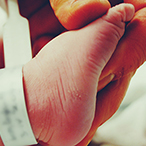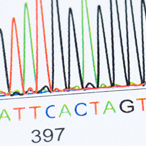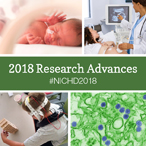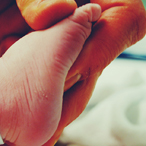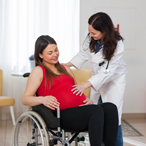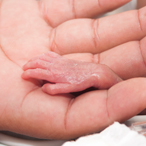Young children who live close to a major roadway are twice as likely to score lower on tests of communications skills, compared to those who live farther away from a major roadway, according to an analysis by researchers at the National Institutes of Health.
News
NICHD issues News Releases and Media Advisories to the news media. Spotlight and Research Feature articles explain NICHD research findings and public health issues to the general public. An Item of Interest is a short announcement of relevant information, such as a notable staff change.
Media Advisory: Physicians may overprescribe antibiotics to children during telemedicine visits, NIH-funded study suggests
Children are more likely to be overprescribed antibiotics for colds, sinus infections and sore throats during telemedicine visits than during in-person visits to primary care providers or urgent care facilities, suggests a study funded by the Eunice Kennedy Shriver National Institute of Child Health and Human Development (NICHD), part of the National Institutes of Health.
Media Advisory: NIH-led task force on pregnancy and lactation receives two-year renewal
Secretary of Health and Human Services renews task force for an additional two years. Task force members will offer guidance and advice on implementing 15 recommendations they submitted in September 2018.
Media Advisory: Lower costs associated with late-preterm steroid therapy, NIH-funded analysis finds
An analysis of a previous study has found more evidence to support giving the steroid betamethasone to pregnant women at risk of late-preterm delivery (between 34 and 36 weeks of gestation), according to a network funded by the National Institutes of Health. Hospital stays for infants whose mothers received the drug cost less on average, compared to stays for infants whose mothers did not take the drug.
Science Update: Prenatal supplement may protect obese offspring from high blood pressure, NICHD-funded study suggests
Obese and overweight young children whose mothers took DHA—a fat found in fish oil—during pregnancy had lower average blood pressure than those whose mothers did not take the supplement during pregnancy, according to a study funded by the NICHD.
Science Update: Delayed cord clamping may benefit infant brain development, NIH-funded study finds
A 5-minute delay in clamping the umbilical cord after birth may benefit an infant’s developing brain, suggests a small study funded by the National Institutes of Health. By 4 months of age, the brains of infants in the study who underwent delayed clamping had more myelin, a brain-insulating material, compared to those whose cords were clamped within 20 seconds.
Media Advisory: New protocol could ease diagnosis of bacterial infections in infants
A new protocol could help emergency room physicians to rule out life-threatening bacterial infections among infants up to 2 months of age who have fevers, potentially eliminating the need for spinal taps, unnecessary antibiotic treatments or expensive hospital stays.
Spotlight: Food for Health: Nutrition Research across the Lifespan
Nutrition is vital to health, growth, and development through all stages of life. Poor nutrition causes health problems and can contribute to heart disease, high blood pressure, diabetes, stroke, cancer, and other diseases. NIH recently released a draft of its first-ever Strategic Plan for NIH Nutrition Research to focus efforts in advancing the scientific understanding of interactions between diet, nutritional status, biological processes, and the environment.
Release: Acyclovir labeling now includes details for treating premature infants infected with herpes virus
Newborns infected with herpes simplex virus (HSV) can be appropriately treated with acyclovir, a drug typically prescribed to adults for the treatment of HSV infections.
Science Update: Genomic sequencing finds that standard screens miss disease risk in 9 percent of newborns
Genomic sequencing identified a higher risk of childhood genetic disorders in 9 percent of newborns who had passed standard screening for these diseases, according to researchers funded by the National Institutes of Health. The findings, from the BabySeq Project, are part of a larger effort to examine whether newborn genomic sequencing is suitable for routine health care.
Media Advisory: NICHD chronicles its major research advances of 2018
As 2018 winds down, a new slideshow highlights a selection of initiatives, therapies, and scientific advances supported by NIH’s Eunice Kennedy Shriver National Institute of Child Health and Human Development (NICHD).
Spotlight: Selected NICHD Research Advances of 2018
In 2018, researchers funded by NICHD made significant progress in advancing the health and well-being of infants, children, teenagers, and adults across the United States and around the world.
Item of Interest: NICHD seeks applications to study effects of maternal opioid use on newborns
The initiative seeks to improve treatment and care of infants and children who were exposed to opioids in the womb.
Release: Low-income, rural kids at higher risk for second- or third-hand smoke exposure
Infants and toddlers in low-income, rural areas may be at higher risk for second- and third-hand smoke than previously reported, according to an NIH-supported study.
Release: NIH to fund national data collection on new mothers with disabilities
Collaboration with CDC aimed at evaluating pregnancy initiatives and outcomes
Release: Myo-inositol unlikely to reduce risk of eye complication in preterm infants
Contrary to results from earlier studies, the vitamin-like substance myo-inositol does not appear to prevent a potentially blinding complication of preterm birth and may even reduce rates of survival among preterm infants, suggests a study funded by the National Institutes of Health.
Release: NIH led task force submits recommendations on research needs for pregnant and nursing mothers
NIH led task force submits recommendations on research needs for pregnant and nursing mothers
Item of Interest: NICHD enhances partnership with Kappa Alpha Psi Fraternity to promote safe infant sleep
As part of NICHD’s continued partnership with the Kappa Alpha Psi Fraternity®, Inc., the NICHD-led Safe to Sleep® campaign recently launched a mini-grant program to support fraternity members in conducting safe infant sleep outreach. The mini-grants will enable Kappa members to lead and host activities in their communities, where they can share safe infant sleep messages in culturally sensitive ways.
Media Advisory: NIH study finds no significant link between brain injury and IV fluid treatment of pediatric diabetic ketoacidosis
Research supported by the National Institutes of Health finds that giving children intravenous (IV) fluids to treat diabetic ketoacidosis—an emergency complication of untreated diabetes—does not appear to worsen the brain swelling that may accompany the condition.
Release: Anti-HIV drug combination does not increase preterm birth risk, study suggests
A drug combination aimed at preventing transmission of HIV from a pregnant woman to her fetus likely does not increase the risk for preterm birth and early infant death, according to a re-analysis of two studies funded by the National Institutes of Health.
 BACK TO TOP
BACK TO TOP








